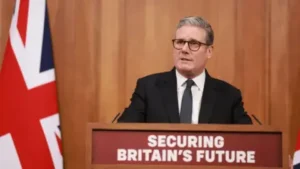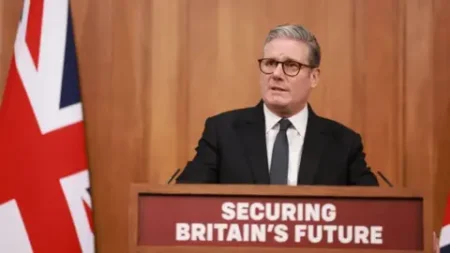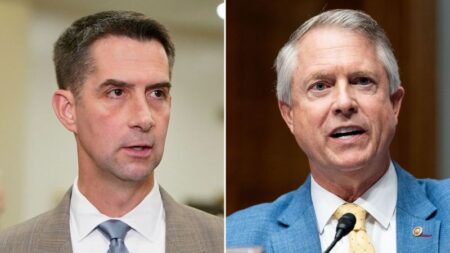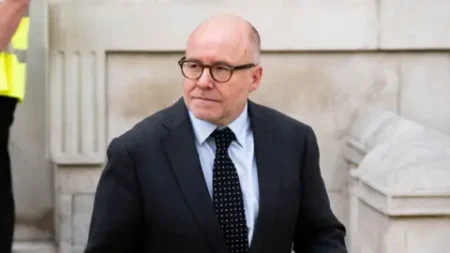**Starmer’s Stormy First Year: Navigating Through Crises**
The first year of Sir Keir Starmer’s tenure as the leader of the Labour Party has ended in turmoil, characterized by a series of crises that have not only tested his leadership but have also raised questions about the future of his party. This reflection highlights the rapid transition from celebratory moments following the Labour’s return to power in the 2024 general election to the present-day challenges that loom over his administration.
As the polls closed on July 4, 2024, the Labour Party was filled with anticipation, recognizing the potential of returning to government after a long period in opposition. Despite a landslide victory, Sir Keir felt a heavy burden of responsibility on his shoulders. In an interview reflecting on that exhilarating moment, he expressed a sense of competition, noting that he wished for the scale of success experienced by former Prime Minister Tony Blair in 1997. Surrounded by his family and initial advisers, the emotional complexity of stepping into a leadership role became apparent, particularly for his children who were about to see their lives change profoundly.
The euphoric atmosphere, however, quickly gave way to crises, marking the start of a challenging chapter in Starmer’s premiership. Analysts began to question why the Labour leader’s initial political “honeymoon” was so short-lived. What had led to the drastic shifts in mood among party ranks and with the public?
The backdrop of Starmer’s success included several significant challenges for his newly appointed cabinet. Many of the ministers were unfamiliar with the workings of government, having largely known only the opposition benches during the previous 14 years. Starmer was keenly aware of this inexperience. He dedicated time as opposition leader to understand international crises, particularly the situations in Ukraine and the Middle East, by liaising with decision-makers in government and civil services, including insights from the White House shared by National Security Adviser Jake Sullivan.
Despite this preparation, complexities arose within the government machinery itself. Notably, the government’s domestic response to issues was hindered by cautious tactics. Many members on the left felt the campaign lacked boldness and innovation. Indeed, leaders like Sharon Graham of the Unite union called for a more dramatic shift in policy, suggesting that a more managerial approach was insufficient to meet the radical expectations of the electorate.
Moreover, Sir Keir’s leadership was marked by a strategic shift from the policies associated with his predecessor, Jeremy Corbyn. While he initially offered a variant of “Corbynism without Corbyn,” Starmer quickly distanced himself from those ideological frameworks, diluting bold promises and focusing on reassurance instead.
As preparations unfolded for government, Starmer recruited Sue Gray, known for her role in the Partygate investigation against former Prime Minister Boris Johnson. Initially regarded as a coup by some, Gray’s appointment was fraught with its own struggles as tensions over her involvement in political questions surfaced. Her resignation amidst criticism suggested deeper structural issues within the government and placed Starmer at a crossroads.
By early 2025, his government faced what felt like its first real crisis, marked by brutal riots spurred by misinformation, demonstrating that the UK was facing challenges akin to those seen during the tumultuous 2011 events. The rapid removal of rioters from the streets was seen as a strong response and yet set the stage for branding pressures such as “two-tier Keir” – a term questioning the consistency of justice in his administration.
Starmer’s attempts to maintain government focus were challenged by emerging discontent over significant economic decisions, notably the means-tested winter fuel payment cuts. Critics viewed these policies as a betrayal, and such missteps contributed to declining public sentiment toward his leadership.
Despite these difficulties, Starmer’s government found a degree of success on the international stage, notably in handling relationships with allies while fostering partnerships in Europe and bolstering support for Ukraine amid geopolitical tensions.
However, domestically, the subsequent local elections and the loss of by-elections marked a pivotal reversal for Starmer’s party, signaling to him the urgent need to tighten focus and articulate clear priorities to satisfy an electorate hungry for solutions to pressing issues such as cost of living and healthcare.
Ultimately, Starmer’s first year in office encapsulates the precarious nature of contemporary UK politics, where the interplay of legacy, public expectations, and the efficacy of governance create a challenging environment for any leader. His government is currently at a critical juncture as it seeks to demonstrate its commitment to responsible management amid scrutiny and unrest. The road forward will undoubtedly test not only Starmer’s leadership abilities but also the Labour Party’s capacity to connect with the electorate in meaningful ways once again.











